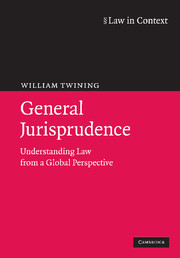Book contents
- Frontmatter
- Contents
- Preface
- Acknowledgements
- List of abbreviations
- Further abbreviations
- Part A
- 1 Jurisprudence, globalisation and the discipline of law: a new general jurisprudence
- 2 Analytical jurisprudence in a global context
- 3 Mapping law: Families, civilisations, cultures and traditions
- 4 Constructing conceptions of law: Beyond Hart, Tamanaha and Llewellyn
- 5 Normative jurisprudence, utilitarianism, and theories of justice
- 6 Human rights as moral, political and legal rights
- 7 Meeting the challenges to human rights: Griffin, Tasioulas and Sen
- 8 Empirical dimensions of law and justice
- Part B
- 14 Conclusion
- Bibliography
- Index
6 - Human rights as moral, political and legal rights
Published online by Cambridge University Press: 05 June 2012
- Frontmatter
- Contents
- Preface
- Acknowledgements
- List of abbreviations
- Further abbreviations
- Part A
- 1 Jurisprudence, globalisation and the discipline of law: a new general jurisprudence
- 2 Analytical jurisprudence in a global context
- 3 Mapping law: Families, civilisations, cultures and traditions
- 4 Constructing conceptions of law: Beyond Hart, Tamanaha and Llewellyn
- 5 Normative jurisprudence, utilitarianism, and theories of justice
- 6 Human rights as moral, political and legal rights
- 7 Meeting the challenges to human rights: Griffin, Tasioulas and Sen
- 8 Empirical dimensions of law and justice
- Part B
- 14 Conclusion
- Bibliography
- Index
Summary
Bentham's utilitarianism has so long been a source of progressive social policy and the main intellectual support of the criticism of our law that we have not yet developed a theory of individual rights, comparable with utilitarian theory in clarity, in detailed articulation, and in appeal to practical men. (Herbert Hart)
The only game in town? Human rights theory: five perspectives
Some commentators claim that the language of human rights has become the dominant mode of public moral discourse of the last fifty years, marginalising or replacing other moral discourses, such as distributive justice, the common good, and solidarity. A striking example of this view is articulated by Upendra Baxi at the start of his book on The Future of Human Rights:
Much of the twentieth century of the Christian Era (CE), especially its latter half, stands justly hailed as the Age of Human Rights. No preceding century in human history witnessed such a profusion of human rights enunciations on a global scale. Never before have the languages of human rights sought to supplant all other ethical languages. No previous century has witnessed the proliferation of endless normativity of human rights standards as a core aspect of intergovernmental desire. Never before has this discourse been so varied and diverse. The then Secretary General of the United Nations [Boutros Boutros Ghali] was, perhaps, right to observe [in 1993] … that human rights constitute ‘a common language of humanity’. Indeed in some ways, human rights sociolect emerges, in this era of the end of ideology, as the only universal ideology in the making, enabling both the legitimation of power and the praxes of emancipatory politics. […]
- Type
- Chapter
- Information
- General JurisprudenceUnderstanding Law from a Global Perspective, pp. 173 - 201Publisher: Cambridge University PressPrint publication year: 2009

